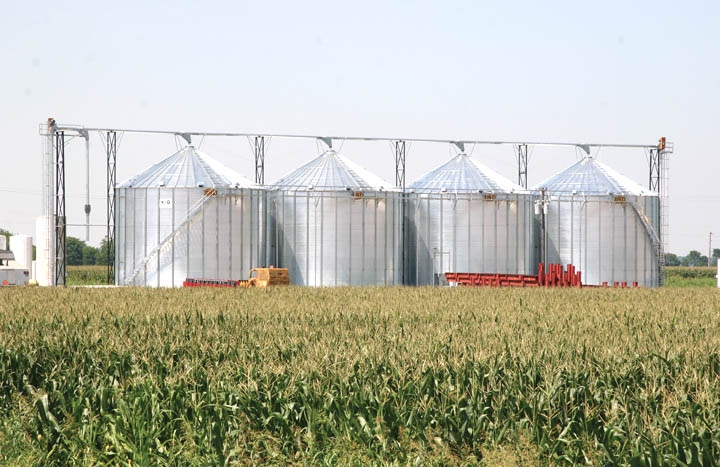Secretary Perdue signs proclamation for Grain Bin Safety Week
Grain Bin Safety Week Feb. 16-22 encourages producers to evaluate safety procedures on their farms.

In 2018, there were 30 documented grain entrapment cases, and half resulted in a fatality. With the number of accidents increasing, the U.S. Department of Agriculture said it must intensify efforts to educate farmers. Agriculture Secretary Sonny Perdue issued a proclamation naming Feb. 16-22 as Grain Bin Safety Week.
The purpose of Grain Bin Safety Week is to promote education and awareness of hazards and safe work practices in an effort to reduce the number of accidents associated with grain handling and storage. Each year, thousands of farmers are exposed to the life-threatening hazards associated with entering grain bins to remove rotting or clumped grain. In just a few seconds, an adult can sink waist-deep in the quicksand-like suction of flowing grain, rendering the person unable to get free without help. Although these hazards are well known in the industry, they are often underestimated until it’s too late.
Recently, the secretary sat down with South Dakota Gov. Kristi Noem to talk about the importance of grain bin safety on the farm. Noem grew up on a farm in Hamlin County, S.D., and has a personal connection to farm safety. She has been an advocate for increased grain bin safety efforts for years.
“My life changed forever when we lost my dad in a grain bin accident, and while farmers are often in a hurry to get things done, nothing is worth losing a life,” Noem stated, adding that she is grateful for Perdue’s leadership in highlighting this important issue.
“This Grain Bin Safety Week, I want to encourage producers to evaluate safety procedures on their farms and ranches. Slow down and be safe – your family will thank you for it,” Noem said.
“We hope grain operators, farmers and community leaders will join us in expanding knowledge of safe practices not just during National Grain Bin Safety Week but year-round,” Perdue said. “Tragedies like the one Gov. Noem’s family experienced happen too frequently and call for greater action.”
To raise awareness of these dangers and prevent all-too-common accidents, Nationwide has launched its seventh annual Nominate Your Fire Department Contest in recognition of Grain Bin Safety Week. The goal is to help prevent injuries and fatalities by promoting safe bin entry procedures when entry is absolutely necessary. This inlcudes maintaining quality grain, testing the bin atmosphere for toxic gases, wearing proper safety equipment and always utilizing a spotter who can help if needed. Nominations for this year’s Nominate Your Fire Department Contest are open until April 30.
This year, Grain Bin Safety Week runs from Feb. 16-22 and has been officially recognized by the following states: Illinois, Indiana, Iowa, Minnesota, Missouri, Nebraska, New York, North Dakota, Ohio, Pennsylvania, South Dakota, West Virginia
Since 2014, Nationwide has awarded grain rescue tubes and training to 111 fire departments in 26 states.
“When we initiated Grain Bin Safety Week in 2014, the goal was to reduce the occurrence of grain bin accidents by raising awareness of the hazards and by equipping first responders with the tools and training needed to respond quickly when necessary,” said Brad Liggett, president of Nationwide Agribusiness, the leading insurer of farms and ranches in the U.S. “We applaud the USDA’s efforts to bring further national attention to this issue and to our efforts to ensure fire departments have the resources they need.”
Four fire departments included in the program have already put their tubes and training to action by rescuing workers trapped in grain bins. In 2017, the Glenville Fire Department in Minnesota received a call to assist a local farmer who had fallen into a grain silo. Utilizing the grain rescue tube and training provided to them nearly two years earlier, first responders were able to save the man’s life, even though he had been engulfed up to his face in flowing corn.
Most recently, in June 2019, the Wauzeka Fire Department in Wisconsin utilized its rescue tube to save the life of a farmer trapped for more than an hour before he was discovered by a truck driver.
According to researchers at Purdue University, 370 grain entrapment cases have been recorded in the last 10 years. In 2018, 30 cases were documented, representing a 30% increase from 2017, with half resulting in fatalities. Purdue also estimates that an additional 30% of cases go unreported each year.
A recent report indicated a startling uptick in grain bin accidents as farmers rushed to clear last year’s unused grain, with at least 14 people killed in grain bins between August and December 2019.
For more information about the program, purpose or nomination process, visit www.grainbinsafetyweek.com, or watch this video.
About the Author(s)
You May Also Like



.png?width=300&auto=webp&quality=80&disable=upscale)

